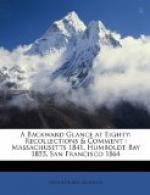“Life’s fevered day declines;
its purple twilight falling
Draws length’ning shadows
from the broken flanks;
And from the column’s head a viewless
chief is calling:
‘Guide right; close
up your ranks!’”
He was ill when it was read. A week from the day of the meeting the happy, well-loved man breathed his last.
JOHN MUIR
John Muir, naturalist, enthusiast, writer, glorifier of the Sierras, is held in affectionate memory the world over, but especially in California, where he was known as a delightful personality. Real pleasure and a good understanding of his nature and quality await those who read of the meeting of Emerson and Muir in the Yosemite in 1871. It is recorded in their diaries. He was a very rare and versatile man. It was my good fortune to sit by him at a dinner on his return from Alaska, where he had studied its glaciers, and had incidentally been honored by having its most characteristic one named after him. He was tremendously impressed by the wonder and majesty of what he had seen, but it in no wise dimmed his enthusiasm for the beauty and glory of the Sierra Nevada. In speaking of the exquisite loveliness of a mountain meadow he exclaimed: “I could conceive it no punishment to be staked out for a thousand years on one of those meadows.” His tales of experiences in the High Sierra, where he spent days alone and unarmed, with nothing but tea and a few breadcrusts to sustain him, were most thrilling.
I was afterward charmed by his sketch of an adventure with a dog called “Stickeen,” on one of the great Alaskan glaciers, and, meeting him, urged that he make a little book of it. He was pleased and told me he had just done it. Late in life he was shocked at what he considered the desecration of the Hetch-Hetchy Valley by the city of San Francisco, which sought to dam it and form a great lake that should forever furnish a supply of water and power. He came to my office to supervise the publication of the Sierra Club Bulletin, and we had a spirited but friendly discussion of the matter, I being much interested as a supervisor of the city. As a climax he exclaimed, “Why, if San Francisco ever gets the Hetch-Hetchy I shall swear, even if I am in heaven.”
GEORGE HOLMES HOWISON
Among the many beneficent acts of Horatio Stebbins in his distinguished ministry in San Francisco was his influence in the establishment of the chair of Moral Philosophy in the University of California. It was the gift of D.O. Mills, who provided the endowment on the advice of Dr. Stebbins. The first occupant appointed was Professor Howison, who from 1884 to 1912 happily held a fruitful term. He was admirably fitted for his duties, and with the added influence of the Philosophical Union contributed much to the value of the university. A genial and kindly man, with a keen sense of humor, he was universally and deeply respected by the students and by his associates. He made philosophy almost popular, and could differ utterly from others without any of the common results of antagonism, for he generated so much more light than heat. His mind was so stored that when he began to speak there seemed to be no reason aside from discretion why he should ever stop.




